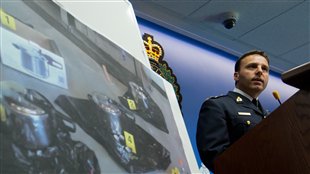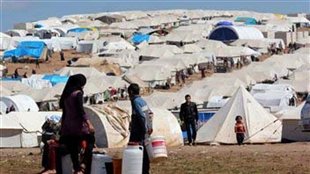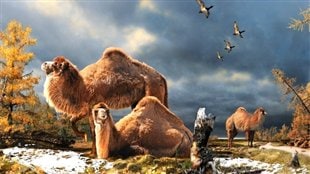Welcome to this week’s edition of the show. Regulars Lynn Desjardins and Wojtek Gwiazda join me, Marc Montgomery to review some of the many interesting topics covered this week. Listen

two people intended to use as explosive devices
is displayed as RCMP Assistant Commissioner
James Malizia speaks during a news conference on
Tuesday, July 2, 2013.
© Darryl Dyck/CP
A potentially horrific terrorist bombing was thwarted by the federal police in Canada this week.
Copying the concept of the Boston Marathon bombing, a man and his girlfriend had planned to detonate bombs at a Canada Day gathering of thousands of people at the British Columbia legislature.
Allegedly converts to Islam, the two were on welfare and were drug addicts. Wojtek reports on comments made by the RCMP, provincial Premier, and federal Minister of Public Safety.
Then, some proposed changes to immigration rules have raised the ire of the Canadian Council for Refugees.
The advocacy groups says the changes will be damaging and extremely painful for families coming to Canada .

proposed government changes making it harder
for 19-21 year-olds to apply for permanent
residency
© AP Photo/Aleppo Media Center AMC
Under the present rules, children up to the age of 21 are still considered as family dependents, and are eligible under the family rules.
The government wants to change that by reducing the “dependant” statsu to age 18, which would affect those 19 to 21 year-olds applying for permanent residence in Canada whether they be immigrants, refugees or in the family class of applicants.
Lynn gets reaction from the Council.

Camels once roamed a forested Arctic in the Pliocene
era of about 4 million years ago. Scientists are
trying to date changes in flora and fauna and the
landscape itself to find out when change occurred and
possibly why.
© Julius T. Csotonyi illustration
And the frozen and barren Arctic we know today, wasn’t always so.
Four million years ago there were giant beaver, horses, even camels, bigger than today, all roaming a boreal forest.
Scientists will be travelling to the high Arctic this summer to continue work into finding out exactly when changes began to take place, and the conditions, such as C02, that relate to those changes…all of which will help climatologists figure out what’s happening to climate now, and what may lie ahead.
Geomorphologist and geochronologist John Gosse of Dalhousie University in Nova Scotia talks about their work in the high Arctic.







For reasons beyond our control, and for an undetermined period of time, our comment section is now closed. However, our social networks remain open to your contributions.